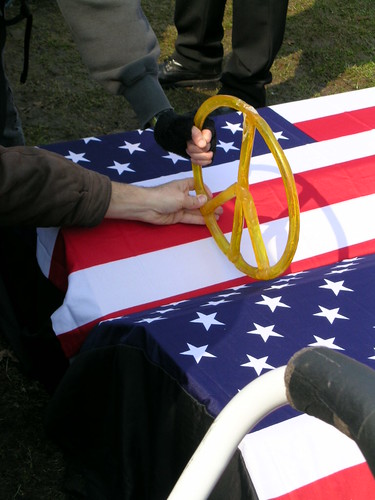
This essay is an exploration of how love and compassion can survive and prosper in a world where violence is prevalent and accepted.
I am a relative pacifist. So I often question, "Do we even need violence? Can we live without violence? Should we, given our animal-nature?"
Most people would agree that love and compassion should be shown in most situations. But what about in an Israel-Lebanon type scenario? Hezbollah kidnaps 2 of your soldiers, how do you respond? Are peaceful, compassionate protests and negotiations viable? Or does that just encourage further incursions?
In Tibet, the Dalai Lama has always forbidden violent protests or responses to China's occupation. No further "expansion" has come of this, but is that because the rest of the world would violently oppose further takeovers by China? Or is China actually content with Tibet, and the Dalai Lama's response has maintained peace where otherwise there could have been bloodshed?
I read a story recently where a Buddhist monk was held captive in a prison in Tibet, where he was beaten and tortured, kept hungry and alone. This monk fled Tibet for India, where he met with the Dalai Lama. The Dalai Lama asked him, "Was there ever a time you felt your life was truly in danger?" The monk answered, "In truth, the only time I truly felt at risk was when I felt in danger of losing compassion for my jailers." That, to me, is the most heroic modern story I have ever heard. But if we had a majority of people committed to compassion like this Buddhist monk, would they be overcome by those who would take advantage of them?
This makes for an interesting paradox. Christ called for a turning of our other cheek, the Buddha instructed us not to harm other beings; but if we do this, will militant, extremist factions attack us out of their own misguided self-interest? Yet these great sages were the most wise people who ever lived, and we put great faith in their teachings. We must at least consider their advice.
So what is the answer? I don't think there is an absolute, correct answer to this dilemma. Dogmatic, doctrinal answers fail us here, as they do everywhere. We must apply wisdom to, and account for the practical parameters of, the situation. Our great sages' calls for peace and love and compassion form the ultimate path, the one we try our hardest to follow. But in our current world, many extremists may take this as an invitation to further their own self-interests, territorial and cultural, uncontested. Hence, I think that violent response remains a necessity in our current world. However, that being said, I applaud the great calls for peace, the protests, and the political movements to end war and violence, because to move toward the perfect path of peace expressed by our saints, we need to apply constant pressure on our governments to end hostilities.
For example, consider Iraq. An immediate, complete withdrawal of troops would be foolhardy, as Iraq would likely plunge into civil war. However, groups are right to call for such immediate action, to keep applying pressure to end violence. It is like walking up a down-escalator. Human violence carries us down, but we need to always be walking up, lest we collapse into a hellish state where chaotic violence is the only rule. Sometimes we may slow our walk and hence drift down slowly. But as long as we increase our pace often enough, we can continue making progress toward a life of compassion and turning our other cheek.












